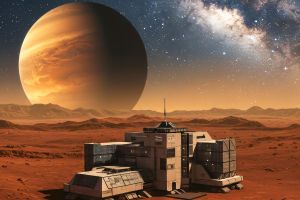Hey Lykkers! Have you ever stared up at the sky and wondered what would happen if the world just… stopped? Not figuratively — like a dramatic pause in a movie — but literally stopped spinning. Just for 10 seconds.
You might think, “Well, it’s only 10 seconds, how bad could it be?”
Let’s dive into this science-powered nightmare scenario and see what those 10 seconds could actually mean for us.
Earth Is Spinning… Really Fast
First things first — our planet isn’t just chilling in space. Earth spins at about 1,670 kilometers per hour (1,037 mph) at the equator. We don’t feel it because everything — the ground, air, buildings, even our bodies — is moving at the same speed.
But if the spinning stopped instantly, our bodies (and everything not nailed down) would keep going at that original speed. That’s basic physics: an object in motion stays in motion unless acted upon.
In simpler words: we’d all go flying.
You’d Be Thrown at 1,000+ MPH
Imagine driving a car at full speed and slamming on the brakes. You lurch forward, right? Now imagine the entire planet is that car — and all of us are passengers not wearing seatbelts.
If Earth stopped suddenly, everything on the surface would launch eastward at over 1,000 miles per hour. Trees, people, cars, skyscrapers — tossed like popcorn in a blender. Even mountains might crumble under the stress.
And remember, it’s not just us. The oceans and atmosphere would keep moving too.
The Oceans Would Go Wild
The seas aren’t attached to the Earth’s crust, so they’d continue surging forward at their original speed. That would cause catastrophic tsunamis, flooding coastal cities within moments. Massive waves — hundreds of feet high — could wipe out entire continents.
Even after the 10 seconds were up, the damage would be done. Flooding, erosion, and chaos would follow for days or even weeks.
Supersonic Winds, Anyone?
Just like water, air would keep moving too. With the Earth suddenly stopping beneath it, we’d be hit by supersonic winds, especially near the equator. These air currents would tear through buildings, forests, and anything else in their path.
Even if you somehow avoided being launched into the air, the wind would likely finish the job. We’re talking storm systems more powerful than anything Earth has ever seen.
Earth’s Magnetic Field Would Freak Out
Here’s a wild twist: the Earth’s spinning core plays a huge role in generating our magnetic field — the invisible shield that protects us from harmful cosmic radiation.
If the planet suddenly stopped spinning, even briefly, the magnetic field could weaken or fluctuate wildly. That might expose us to solar radiation, knocking out satellites, power grids, and communication systems.
Yup, it gets worse the deeper you go.
Would the Earth Restart?
In this wild what-if scenario, let’s say after 10 seconds, the Earth starts spinning again like nothing happened. Sounds like a happy ending… but the physical damage would be devastating. Earthquakes, volcanic eruptions, fractured tectonic plates — all triggered by that instant pause.
It would be like trying to slam your spinning top, stop it cold, and expect it to pick back up smoothly. Spoiler: it doesn’t.
Could This Actually Happen?
Luckily, no.
There’s no natural force strong enough to instantly stop Earth’s rotation and then restart it 10 seconds later. The energy required would be beyond comprehension — way more than what any asteroid, alien tech, or sci-fi machine could deliver.
So, this is more of a mental playground for science lovers than a real-world threat. Still… fun (and terrifying) to imagine, right?
Final Thoughts
So Lykkers, what if Earth stopped spinning for 10 seconds?
In short: chaos, destruction, and global disaster.
It’s a cool reminder of just how smoothly and perfectly our planet is operating 24/7 — silently spinning beneath our feet. We owe a lot to that constant motion. It keeps our days happening, our weather systems balanced, and our oceans where they belong.
So next time you look up at the stars, give a little thank-you to gravity, physics, and our trusty spinning Earth. And hey — what wild science scenario should we dive into next? Let’s explore it together!


